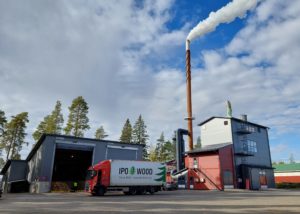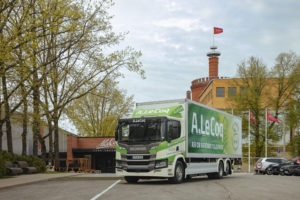Case: TOGETHER TOWARDS A MORE SUSTAINABLE ENERGY ECONOMY
For Olvi Group, environmental responsibility means, to a large extent, the effective use of resources – that is the effective use and recycling of raw materials, other materials, and energy, as well as the optimisation of transportation.
Olvi Group has accounted for sustainable development for years now in terms of its plants’ equipment and energy solutions. In recent years, Group companies have made substantial investments to achieve the target of carbon-neutral production.
“We want to be among the first in developing our operations toward a more energy efficient and greener future. We are now increasingly focused on active dialogue and development cooperation with our stakeholders. This allows us to promote the reduction of emissions within the value chain and product solutions that account for sustainable development in a holistic way,” says Pia Hortling, Director of Public Relations and Procurement at the parent company Olvi.
In 2018, the parent company Olvi commissioned a company-owned heat plant that runs on biomass-based, renewable energy and produces the steam and heat required in production processes. The energy source is composed of wood chips sourced from nearby areas and the mix of bark and sawdust generated as a by-product of wood processing. The flue gas scrubber fitted in the stack of the heat plant cleans the released water vapour of sulphur and particulate emissions and recovers any waste heat.

At the Bryggeriet Vestfyen brewery in Denmark, the use of renewable energy has been the norm for several years now. The brewery relies on a biopower plant equivalent to the heat plant of the Iisalmi production facility. The A. Le Coq plant and the Cēsu Alus plant in Latvia have invested in biogas plants which recover biogas from wastewater.
The Group focuses on increasing the volume of biofuels. In 2022, all energy used in the manufacturing of products at the parent company Olvi was bioenergy. Olvi’s Iisalmi plant has almost achieved its own target for 2023 – a carbon-neutral plant – in 2022.
Green electricity is in use at production facilities in Finland, Estonia, Latvia and Lithuania. LED lighting and intelligent lighting control, as well as the more efficient control of ventilation, have also been widely adopted. A majority of the gas-powered forklifts in Group companies have been replaced by zero-emission electric forklifts.
Group companies use the recovered heat energy for a variety of purposes, such as heating water and properties. For example, the parent company Olvi’s domestic water has been heated with the heat energy recovered from the brewhouse process for several years. New opportunities to this are searched all the time. For example, Volfas Engelman started to use recovered heat for heating the warehouse in 2022.
A carbon dioxide recovery plant, which will begin operating in 2023, is currently under construction in Iisalmi’s brewery. In the future, the carbon dioxide generated during the fermentation process can be reused in the aeration of beverages, for example.
 The Group is studying opportunities for using renewable energy, such as solar panels. A. Le Coq’s plant in Estonia and Volfas Engelman’s Uniqa water plant in Lithuania have already deployed solar panels.
The Group is studying opportunities for using renewable energy, such as solar panels. A. Le Coq’s plant in Estonia and Volfas Engelman’s Uniqa water plant in Lithuania have already deployed solar panels.
The Group invests in the reduction of its environmental footprint in transportations, both in terms of input materials and finished products. In the summer of 2022, A. Le Coq deployed the first electric lorry in the Baltic countries. This is a significant step toward the reduction of carbon dioxide emissions resulting from transportation.